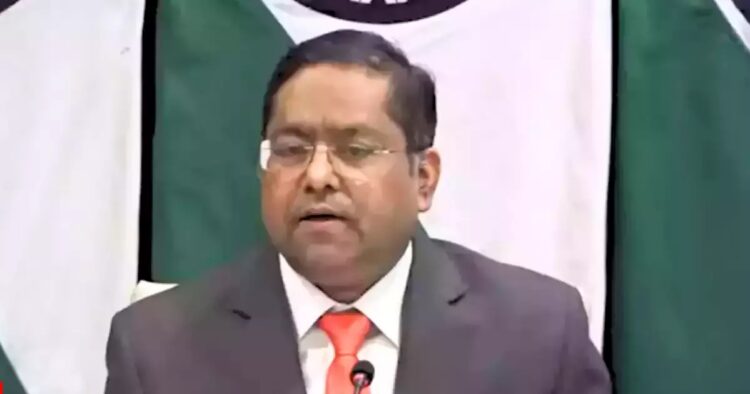Bharat firmly rejected a joint statement from China and Pakistan that raised concerns over unilateral actions in resolving issues in South Asia, including Jammu and Kashmir. The Ministry of External Affairs spokesperson, Randhir Jaiswal, emphasized Bharat’s longstanding position that the Union Territory of Jammu and Kashmir and Ladakh are integral parts of Bharat and will always remain so.
Jaiswal stated unequivocally that no other country has the right to interfere in Bharat’s internal affairs regarding these regions.
The joint statement by China and Pakistan, issued on June 8, expressed opposition to any unilateral actions in South Asia and called for the resolution of all outstanding disputes through peaceful means. It also highlighted discussions on the situation in Jammu and Kashmir during the visit of Pakistani Prime Minister Shehbaz Sharif to China.
Breaking News: New Delhi strongly rejects "unwarranted references" to Jammu & Kashmir by China and Pakistan. India asserts its consistent and well-known position on the Union Territory. Stay tuned for more updates. #India #China #Pakistan #JammuAndKashmir #ForeignPolicy pic.twitter.com/yh48QFHE6Z
— Ritam English (@EnglishRitam) June 13, 2024
Bharat’s response reiterated its rejection of any external interference in matters related to Jammu and Kashmir. The spokesperson underscored that the dispute over Jammu and Kashmir should be resolved in accordance with the UN Charter, relevant UN Security Council resolutions, and bilateral agreements between Bharat and Pakistan.
Moreover, the Bharatiya statement raised objections to the China-Pakistan Economic Corridor (CPEC) projects that it claims are in territories under Pakistan’s illegal occupation. The Ministry of External Affairs spokesperson strongly opposed any efforts by foreign countries to legitimize Pakistan’s occupation of these territories, which Bharat asserts impinges on its sovereignty and territorial integrity.
Bharat has historically rejected similar joint statements by China and Pakistan regarding Jammu and Kashmir. The latest exchange underscores the continuing tensions and differing perspectives between the countries involved in the region’s geopolitical dynamics.
The statements from Bharat come amidst ongoing geopolitical tensions and strategic maneuvering in South Asia, where Bharat, Pakistan, and China each maintain significant interests and stakes. The region has long been a point of contention, particularly with regard to Jammu and Kashmir, which has been a subject of dispute between Bharat and Pakistan since partition in 1947.
The Bharatiya government’s strong rejection of external commentary on its internal matters reflects its firm stance on sovereignty and territorial integrity. As diplomatic exchanges continue, observers watch closely to see how these tensions will shape regional dynamics and international relations in the coming months.
















Comments